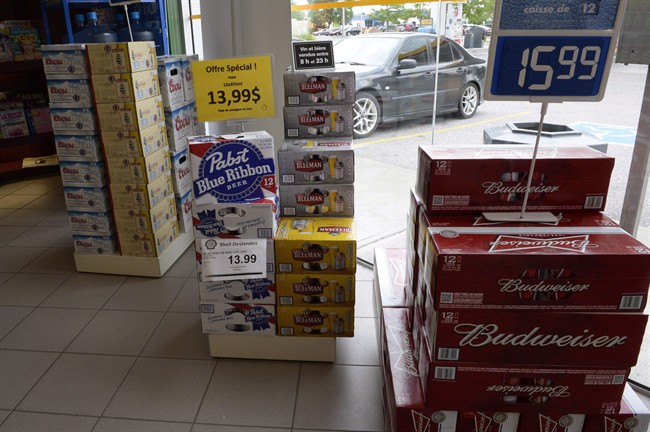A battle over cross-border beer sales threatens to end Canadian federalism as it was originally conceived, the New Brunswick government argues in a submission to the country’s top court.

In a statement of facts to the Supreme Court of Canada, the province says allowing a New Brunswick man to purchase alcohol in a Quebec border town could ultimately “redesign Canadian federalism.”
Gerard Comeau was charged with possessing liquor not purchased from the New Brunswick Liquor Corporation and fined $292.50 after police stopped him on his way home from Quebec with 14 cases of beer and three bottles of liquor in his trunk.
He took the case to court and a New Brunswick trial judge ruled that the charge violated constitutional law, overturning a ban on bringing alcohol across provincial boundaries.
READ MORE: New Brunswick’s cross-border beer battle bubbles towards Supreme Court
“This case began as a simple ticket offence. A simple case it is not,” the New Brunswick government said. “This ‘simple case’ and the trial decision that resulted raise the issue of competing constitutional provisions and propose an end to Canadian federalism as it was originally conceived, has politically evolved and is judicially confirmed.”
At issue is a section of the New Brunswick Liquor Control Act prohibiting anyone in the province from having more than 12 pints of beer not purchased through a liquor store in the province.

Get breaking National news
However, the trial judge said the law is at odds with Section 121 of the Constitution Act, which reads “All articles of the growth, produce, or manufacture of any one of the provinces shall, from and after the union, be admitted free into each of the other provinces.”
Judge Ronald LeBlanc said the original framers of the Constitution never intended that laws should blatantly block the free flow of goods within their new country.
The New Brunswick Court of Appeal declined to hear the Crown’s appeal, but the country’s highest court agreed to hear the potentially landmark case on what the fathers of Confederation really meant by the constitutional clause about free trade among provinces.
WATCH: Cross-border New Brunswick beer buyer mounts constitutional challenge
The province is asking the top court to rule that the provincial Liquor Control Act does not violate the Constitution Act.
The New Brunswick government acknowledges that Section 121 of the Constitution has been “the subject of political debate and discussion for decades.”
However, the province argues that regulating liquor within its borders is a “constitutionally permissible example of co-operative federalism” and that siding with the trial judge would “undermine this co-operative legislative effort and would redesign Canadian federalism.”
“The courts would then be required to reformulate Canadian federalism as it now exists,”the province says.
Submissions from other provinces and Ottawa are due mid-October, followed by submissions from Comeau’s lawyers by the end of October.







Comments